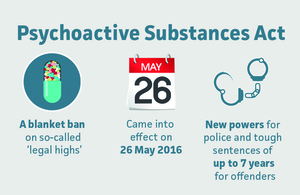Headshops closed and offenders arrested after 'legal highs' ban
Three months after landmark legislation commenced on 26 May 2016, figures show 332 retailers no longer selling psychoactive substances and 186 arrests.

Hundreds of retailers across the United Kingdom have either closed down or are no longer selling potentially dangerous psychoactive substances, according to new figures released today (Friday 26 August).
The figures were announced as the Minister for Safeguarding, Vulnerability and Countering Extremism, Sarah Newton, joined officers from Northumbria Police’s New Psychoactive Substances Taskforce on patrol in Newcastle city centre to see some of the retailers closed following the act’s introduction 3 months ago, on 26 May.
The new figures also show that police forces are using the new legislation to tackle the supply of psychoactive substances and have already arrested 186 alleged offenders.
Nationally, 308 shops have stopped selling the dangerous drugs, and 24 headshops have closed down altogether.
Minister for Safeguarding, Vulnerability and Countering Extremism Sarah Newton said:
These dangerous drugs have already cost far too many lives. I’m encouraged to see that – 3 months in – police are using their new powers to take dealers off our streets and that so many retailers have been denied the chance to profit from this reckless trade.
The Psychoactive Substances Act is sending out a clear message – this government will take whatever action is necessary to keep our families and communities safe. These drugs are not legal, they are not safe and we will not allow them to be sold in this country.
In 2014 alone, new psychoactive substances were involved in the deaths of 144 people in the UK, up from 31 deaths in 2010 and there have been a total of 444 deaths involving new psychoactive substances since 2010.
National Police Chiefs’ Council Lead for Psychoactive Substances, Commander Simon Bray, said:
The significant reduction in the number of headshops and retailers stocking psychoactive substances in just 3 months demonstrates the hard work of officers across the country in getting these harmful drugs off the market.
It is still early days but the police enforcement approach combined with education and support services for users is helping to reduce the damage that misuse of these substances can cause in communities.
In addition to the police action taken since the legislation was introduced, the National Crime Agency has taken action to shut down websites found to be in breach of the ban. It is working with international partners to address those websites based overseas.
Penalties for offenders and powers for law enforcement include:
- up to 7 years in prison for the supply, production, possession with intent to supply, importation or exportation of a psychoactive substance
- up to 2 years in prison for possessing a psychoactive substance in a custodial institution
- prohibition and premise orders which will allow police to shut down headshops and online dealers, with up to 2 years in prison for those who fail to comply
Prior to the introduction to the Psychoactive Substances Act 2016, the government took extensive action against so-called ‘legal highs’ having banned more than 500 dangerous drugs under the Misuse of Drugs Act since 2010.
The ban ends this game of cat and mouse between manufacturers and the government whereby, previously, any new psychoactive substance discovered on the market had to be risk-assessed and the approval of Parliament sought to control a substance – or groups of substances – under the Misuse of Drugs Act 1971.
The figures on arrests and retailers no longer selling psychoactive substances are based on voluntary data returned to the National Police Chief’s Council by 41 police forces in the United Kingdom for the period 26 May to 8 August 2016. They provide an early snapshot of enforcement activity since the commencement of the act.
The definition of an NPS-related death varies between England and Wales, and Scotland. In England and Wales the definition is a drug-related death where a NPS is mentioned on a death certificate, and in Scotland the definition includes where one (or more) NPS were implicated in, or potentially contributed, to the death.